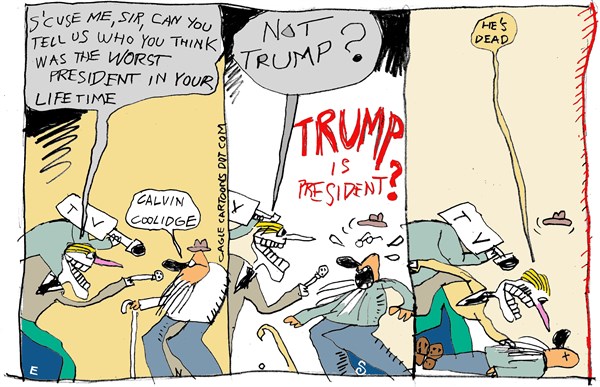Under pressure to balance the budget and align
with Trump, the House GOP has its eye on food stamps, welfare and
perhaps even veterans’ benefits.
House Republicans just voted to slash hundreds of billions of dollars
in health care for the poor as part of their Obamacare replacement.
Now, they’re weighing a plan to take the scalpel to programs that
provide meals to needy kids and housing and education assistance for
low-income families.Donald Trump’s refusal to overhaul Social Security and Medicare — and his pricey wish-list for infrastructure, a border wall and tax cuts — is sending House budget writers scouring for pennies in politically sensitive places: safety-net programs for the most vulnerable.
The proposal, which would be part of the House Budget Committee's fiscal 2018 budget, won't specify which programs would get the ax; instead it will instruct committees to figure out what to cut to reach the savings. But among the programs most likely on the chopping block, the sources say, are food stamps, welfare, income assistance for the disabled and perhaps even veterans benefits.
If enacted, such a plan to curb safety-net programs — all while juicing the Pentagon’s budget and slicing corporate tax rates — would amount to the biggest shift in federal spending priorities in decades.
Atop that, GOP budget writers will also likely include Speaker Paul Ryan’s (R-Wis.) proposal to essentially privatize Medicare in their fiscal 2018 budget, despite Trump’s unwavering rejection of the idea. While that proposal is more symbolic and won’t become law under this budget, it’s just another thorny issue that will have Democrats again accusing Republicans of “pushing Granny off the cliff.”
“The Budget Committee is trying to force the entire conference and committees of jurisdiction to focus on ways to bring down this deficit,” said senior budget panel member Rep. Tom Cole.
Republicans have long sought to tackle the nearly $20 trillion debt, but Trump has tied their hands by ruling out cuts to Social Security and Medicare.
The Oklahoma Republican, however, acknowledged that mandatory spending reductions could become “very tough issues” — though he declined to name which programs would see major cuts:
“These are hard for anybody, no matter where you’re at on the political spectrum.”
While budget writers are well aware of the sensitive nature of their proposal, they feel they have no choice if they want to balance the budget in a decade, which they’ve proposed for years, and give Trump what he wants.
Enraged by Democrats claiming victory after last month’s government funding agreement, White House officials in recent weeks have pressed Hill Republicans to include more Trump priorities in the fiscal 2018 blueprint.
House Budget Republicans hope to incorporate those wishes and are expected, for example, to budget for Trump’s infrastructure plan. Tax reform instructions will also be included in the budget, paving the way for both chambers to use the powerful budget reconciliation process to push a partisan tax bill through Congress on simple majority votes, as well as the $400 billion in mandatory cuts.
“The critique last time was that we didn’t embed enough Trump agenda items into our budget,” said Rep. Dave Brat (R-Va.), a budget panel member. Trump has "made it clear it will be embedded in this budget. … And so people will see a process much more aligned with President Trump’s agenda in this forthcoming budget.”
New spending, however, makes already tough math even trickier for a party whose mantra is “balance the budget in 10 years.” Lawmakers need to cut roughly $8 trillion to meet that goal, budget experts say. And while a quarter of their savings in previous budgets came from repealing Obamacare and slicing $1 trillion from Medicaid, Republicans cannot count on those savings anymore because their health care bill sucked up all but $150 billion of that stash — relatively speaking, mere pocket change to play with.
Republicans’ first reflex would be to turn to entitlement reform to find savings. Medicare and Social Security, after all, account for the lion’s share of government spending and more than 70 percent of all mandatory spending.
But while former Freedom Caucus conservative-turned-White House budget director Mick Mulvaney has tried to convince the president of the merits of such reforms, Trump has refused to back down on his campaign pledge to leave Medicare and Social Security alone. (He’s reversed himself on a vow not to touch Medicaid, which would see $880 billion in cuts under the Obamacare repeal bill passed by the House.)
Mulvaney, sources say, has been huddling on a weekly basis with House Budget Chairwoman Diane Black (R-Tenn.) and Senate Budget Chairman Mike Enzi (R-Wyo.) to plot a path forward. There appears to be some common ground to consider cuts to other smaller entitlement programs: While the Office of Management and Budget would not respond to a request for comment, CQ reported Tuesday that the White House was also considering hundreds of billions in cuts to the same programs being eyed by House budget writers.
“I’ve already started to socialize the discussion around here in the West Wing about how important the mandatory spending is to the drivers of our debt,” Mulvaney told radio host Hugh Hewitt in March. “There are ways that we cannot only allow the president to keep his promise, but to help him keep his promise by fixing some of these mandatory programs.”
Final details of the GOP’s budget plan aren’t expected until June, and specific language mandating the mandatory cuts still hasn’t been written, according to one aide familiar with the process.
Committees would then have several months to put together the department-by-department details on what exactly to cut, proposals that probably won’t land until the fall at the earliest, given the legislative calendar.
The idea could run into problems: It is unclear whether such cuts would be acceptable in the more moderate Senate. In order for the proposal to actually move, Senate Republicans would need to include the same instructions in their own budget.
In the House, Republican leaders hope the moves toward deficit reduction will buy them some good will with conservatives going into September, when the party’s right flank will have to swallow difficult votes to raise the debt ceiling and fund the government.
Cole argued the deficit-trimming push will appeal to the House Freedom Caucus, which blocked the House GOP’s budget on the floor last year in protest of spending levels its members considered too high.
But pleasing conservatives this time around will fuel anxiety on the other end of the conference. Endorsing cuts to programs for the poor will certainly make centrist House Republicans — many of whom were uncomfortable voting to slice Medicaid just weeks ago in the Obamacare repeal bill — very uncomfortable.
Rep. Charlie Dent, a centrist and senior Appropriations Committee member, said budget reconciliation instructions should center solely on tax reform, which “is complex enough on its own,” he said.
“All I can say is: Tax reform by itself is very complex and controversial,” Dent (R-Pa.) said. “Adding some of these other changes will only make the tax reform more difficult.”
Asked about mandatory programs that might be cut, he added: “This will create challenges, no question about it. When so many of the entitlement programs are taken off the table for discussion … that limits our ability to fund the non-defense discretionary programs and other mandatory programs that affect a lot of people.”
GOP backers of the idea will argue in the coming weeks and months that moderates have voted for GOP budgets that included similar cuts in the past — so they should be able to support them again.
But if House GOP leadership has learned anything from the Obamacare repeal debacle, it should be that voting for something that has no chance of becoming law and makes for great campaign fodder is much easier than backing a bill that could be enacted.







































